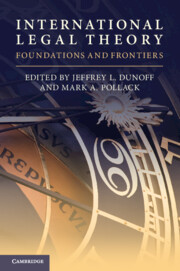Book contents
- International Legal Theory
- Reviews
- International Legal Theory
- Copyright page
- Contents
- Contributors
- Acknowledgments
- Part I Introduction: Setting the Stage
- Part II Traditional Approaches to International Law
- Part III Critical Approaches to International Law
- Part IV Post–Cold War Approaches to International Law
- Part V Interdisciplinary Approaches to International Law
- 12 Rationalist and Behavioralist Approaches to International Law
- 13 The Sociological Perspective on International Law
- 14 The Practice of Interpretation in International Law: Strategies of Critique
- Part VI International Law: Dialogue and Dialectic
- Index
12 - Rationalist and Behavioralist Approaches to International Law
from Part V - Interdisciplinary Approaches to International Law
Published online by Cambridge University Press: 21 July 2022
- International Legal Theory
- Reviews
- International Legal Theory
- Copyright page
- Contents
- Contributors
- Acknowledgments
- Part I Introduction: Setting the Stage
- Part II Traditional Approaches to International Law
- Part III Critical Approaches to International Law
- Part IV Post–Cold War Approaches to International Law
- Part V Interdisciplinary Approaches to International Law
- 12 Rationalist and Behavioralist Approaches to International Law
- 13 The Sociological Perspective on International Law
- 14 The Practice of Interpretation in International Law: Strategies of Critique
- Part VI International Law: Dialogue and Dialectic
- Index
Summary
Realist and (liberal) institutionalist thinkers in international relations have long used rational choice assumptions to explain states’ behavior, but they only more recently entered into legal intricacies or specific legal questions, especially in the United States. By now, this has become a joint enterprise by international lawyers, economists, and rational-choice political scientists. Ever more empirical research is generated, informing also about the empirical validity hypotheses held by rationalist scholars. The research mostly stands on two pillars: the rational choice assumption and, following the traditional international law assumptions in the aftermath of the Westphalian peace, the treatment of the nation-state as a unitary actor, or what has been described as a “black box” state. Rational choice analysis has been used to conceptualize or reframe international law generally, including its sources.
- Type
- Chapter
- Information
- International Legal TheoryFoundations and Frontiers, pp. 261 - 281Publisher: Cambridge University PressPrint publication year: 2022

